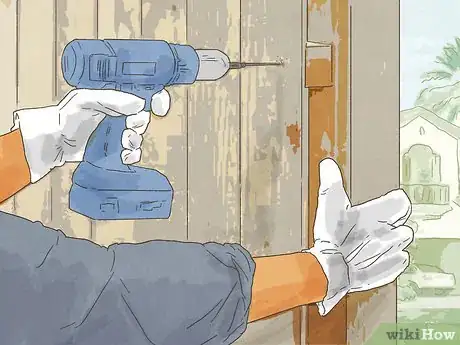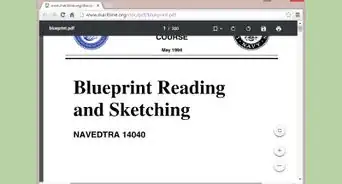This article was co-authored by wikiHow Staff. Our trained team of editors and researchers validate articles for accuracy and comprehensiveness. wikiHow's Content Management Team carefully monitors the work from our editorial staff to ensure that each article is backed by trusted research and meets our high quality standards.
There are 10 references cited in this article, which can be found at the bottom of the page.
wikiHow marks an article as reader-approved once it receives enough positive feedback. In this case, 99% of readers who voted found the article helpful, earning it our reader-approved status.
This article has been viewed 50,616 times.
Learn more...
If you tend to pay close attention to the details and are a stickler for the rules, pursuing a career as a home inspector should be something you consider. Becoming a home inspector can be a fulfilling career that includes travel and allows you to interact with other people on a daily basis. By getting the right education and certification and continuing to hone your skills, you can have a fulfilling career as a home inspector.[1]
Steps
Getting Licenced
-
1Research the licensing requirements in your state. To find licensing requirements in your state, visit The American Society of Home Inspectors website. Licensing requirements vary from state to state and can range from no experience to a high school degree, coursework, licensure, and an apprenticeship. Find the requirements for your particular state so that you have an idea of what you'll need before you can get started.
- Some states require you to also pass a background and criminal history check.[2]
- In Texas you need to pass pre-licencing courses and complete 128 classroom hours before you can take your inspector's exam.
- In New York you need to pass pre-licencing courses and complete 140 classroom hours.
- Idaho does not require you to have a license to be a home inspector.[3]
- If you live outside of the U.S., check with a relevant government agency where you live.
-
2Learn how houses are constructed. Having knowledge about electrical wiring, plumbing, heating systems, cooling systems, and roofing is critical if you want to be a good home inspector. Construction practices have changed over time, so a house that was built decades ago will be very different to one built recently. Having detailed knowledge about how all houses are constructed will give you a better understanding of dangerous housing conditions.[4]Advertisement
-
3Take home inspection and licensing courses. There are various organizations and educational institutions that offer home inspection courses. If you don't want to go to a physical location like a Kaplan University, you can take online courses to achieve your license. Organizations that offer online courses include Inspection Certification Associates, American Home Inspectors Training, and the American Society of Home Inspectors.[5]
-
4Study for the home inspection exam. The National Home Inspector Examination (NHIE) offers a comprehensive list of content that will show up on your exam. Go to their website to get a copy of the outline and research each of the tops in greater detail. Make sure to study the content that will be on the test sufficiently before registering for the test.
- Questions on the NHIE cover safety topics including, roof drainage, exterior doors and windows, driveways, landscaping, balconies, support structures, wiring and electrical, and plumbing.
- The test is four hours long and has around 200 questions.
-
5Register for the National Home Inspector Examination. The NHIE is required if you want to practice in 29 states including places like California, New York, Florida, and Texas. Register for the exam by visiting homeinspectionexam.org.
- Remember to check if this license is required in your state before paying for it.
- In most states the exam costs $225.
- Even if passing the exam is not required in your state you should take it anyway, as passing the test is a good indicator of whether you're ready to be a home inspector.
-
6Pass the home inspection exam and become certified. Once you've registered for the exam online, you'll likely be given a physical location and date that you'll have to take the test. Make sure to get plenty of rest the night before the test and study leading up to it.
- If you fail your initial exam, you can retake the exam in 30 days if you pay another fee.
Getting a Job
-
1Get a job at an established inspecting firm. Look on search engines and job boards for home inspecting job opportunities. Once you have the required certification and education, and have shadowed another home inspector, apply for the job. Companies are looking for clean-cut, organized, and dependable people. Follow the guidelines for a good interview and be sure to communicate effectively and show up on time.
- You can also use any available networking connections and ask around to see which companies are looking for new employees.
- When on the interview remember to emphasize your construction, regulation, and inspection knowledge.
- A drawback from working for a firm is that they will typically take a 40-60% cut of your inspection fee.[6]
-
2Start your own business. If you don't want to work at a firm and already have some experience under your belt, you can start your own business. Home inspection businesses don't have a lot of need for human capital if you're the only one that will inspect the homes. To start your own home inspection company, you'll need a reliable vehicle, a computer and a minimum of $25,000 in working capital for overhead items.
- Consider incorporating your business to protect yourself from bankruptcy if your company fails.
- A large initial cost that you'll have to invest in is business insurance.
- Other potential costs include marketing and advertising, tools, association dues, and office space.
-
3Purchase a home inspecting franchise. A home inspection franchise will give you the initial tools and contacts that are required to land clients and start making money. Marketing and advertising is also usually covered in the form of logos and other promotional materials. Also, they will have methods that have been proven to be profitable in the past, as well as additional support if you're unsure what to do as a business owner. While the cost of a franchise can sometimes be costly, it may be worth the cost if you have limited experience.
- Initial costs, including an initial franchise fee, can cost anywhere up to $40,000 and more.[7]
- Remember to read the Franchise Disclosure Document (FDD) before purchasing any franchise.
- Popular home inspection franchises that you can purchase include Ameri-Spec Inspection Services, Home Team, WIN, and A Pro.
Honing Your Skills
-
1Join a home inspectors organization. A home inspectors group will provide you a wealth of knowledge in the form of distance education and classroom training. The top organizations for home inspectors in the U.S. include the NAHI (The National Association of Home Inspectors) and the ASHI (The American Society of Home Inspectors). Both of these organizations have a significant number of members who work professionally as home inspectors. In addition to the education, you'll also be able to attend chapter meetings and workshops to talk about inspection and regulation.[8]
-
2Get a mentor when first starting off. Some states require you dedicate hours towards an apprenticeship before you can become a certified home inspector. Even if your state doesn't require this, shadowing and working under a seasoned home inspector will give you insight and skills on how you should inspect homes. If you're part of a home inspector association, talk to veteran inspectors and ask if you can be an apprentice under them. If you aren't in an organization contact different firms and see if there is anyone available to take you under their wing.[9]
- Being an apprentice will also give you hands-on training.
- You can ask by saying something like, "I really respect the great work you do and all your experience. I'm looking for someone who could guide me and show me the ropes. Do you think I could work with you for a little bit?"
-
3Go for additional training and education once you're an inspector. Look for regional meetings and seminars that you can attend to stay current and accurate. Many chapters of home inspection organizations will often put on educational events and workshops for existing inspectors.[10] Also, you can use the time around your peers to network with other inspectors.
- Follow up with people that you meet at educational workshops and training by calling them on the phone or shooting them an email.
- In some states, like Oregon, you have to complete some continuing education classes to keep your home inspection license up to date.[11]
References
- ↑ https://www.bls.gov/ooh/construction-and-extraction/construction-and-building-inspectors.htm
- ↑ https://www.ahit.com/news/tips-on-becoming-home-inspector.htm
- ↑ http://fitsmallbusiness.com/how-to-become-a-home-inspector/
- ↑ http://inspectapedia.com/home_inspection/Become_A_Home_Inspector.php
- ↑ http://www.ahit.com/classes.htm
- ↑ http://fitsmallbusiness.com/how-to-become-a-home-inspector/
- ↑ https://winfranchising.com/learn-about-win/what-are-my-startup-costs/
- ↑ http://www.homeinspector.org/Become-a-home-inspector
- ↑ http://www.jobmonkey.com/howto/home-inspector/
About This Article
It can take a lot of work to become a home inspector, but if you have an eye for detail and you care about safety, it could be a great career choice. Start by researching the licensing requirements for home inspectors in your state. Depending on where you live, you might need to take pre-licensing courses or complete an apprenticeship program. Once you finish your training, take and pass the National Home Inspector Examination. To register for the test, visit https://nationalhomeinspectorexam.org/. For tips on finding a job as a home inspector, including advice on starting your own business, read on!


































































